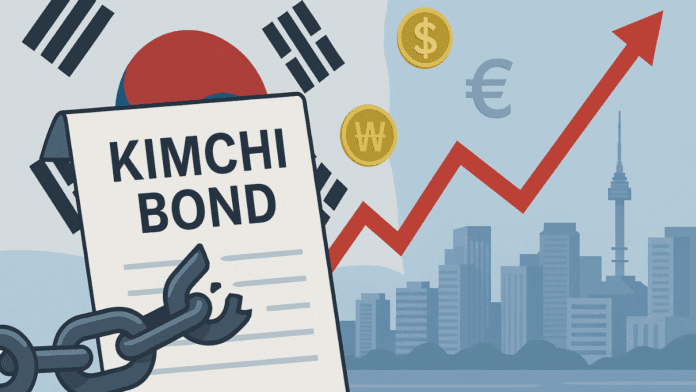South Korea has decided to lift a 14-year-old restriction that stopped local financial institutions from investing in what are called “Kimchi bonds” for use inside the country. This change will take effect starting June 30, as announced by the Bank of Korea.
Kimchi Bonds Unlocked After 14-Year Ban
Kimchi bonds are special types of bonds. Companies issue them in foreign currencies like the U.S. dollar but sell them inside South Korea. They mostly use these bonds to raise foreign currency without going outside the country.
For the past 14 years, the government banned local banks and financial groups in South Korea from buying these bonds for domestic use. It introduced this rule in 2011, fearing that too much local investment in foreign currency bonds could cause problems like rising debt requiring quick repayment in foreign money.
Now, that rule is being removed. The Bank of Korea says this change will make it easier for the country to deal with the current shortage of foreign money, like U.S. dollars. It will also help stop the value of the Korean won from falling further.
Bond Panic Triggers Historic Pivot—Japan Pulls Back as Super-Long Yields Hit Record Highs
Strengthening the Local Market and Currency Supply
According to the central bank, allowing local institutions to freely buy Kimchi bonds will help balance the supply and demand for foreign currencies inside the country. This is very important because South Korea has been under pressure from the weakening won and unstable foreign exchange markets.
When there is not enough foreign money in the country, the value of the won drops. This can make things like imported food and fuel more expensive. By letting local banks and financial firms invest in these foreign currency bonds, more foreign money can stay inside South Korea. This will help the country better manage its foreign currency needs.
The Bank of Korea believes this move will also support the domestic capital market. By making it easier to trade and invest in Kimchi bonds, local investors and companies will have more ways to raise and use foreign money without having to go through complicated or risky steps.
However, the new rule will not apply to privately placed Kimchi bonds. These are bonds that are not sold to the public but are traded between private parties. The central bank says it wants to avoid possible loopholes that could lead to risky deals or hidden debt. So, the ban on private Kimchi bonds remains in place for now.
Boosting Seoul’s Status as a Financial Hub
This policy change is not just about helping the won or the bond market. It is also part of a larger effort by South Korea to make its capital, Seoul, a stronger and more attractive place for global financial business.
German Bonds No Longer Sacred? Japan’s $18B Bond Sell Signals Deep Doubts in Western Economies
The government is allowing more flexibility in handling foreign currency investments. It hopes this change will boost investor confidence in Seoul. Both international and local investors may feel more secure doing business there.
Until now, strict rules on Kimchi bonds made it hard for local firms to access foreign funds easily. The process was complicated and involved legal and regulatory barriers. With this restriction now gone, firms have more freedom to raise foreign currency. More companies may now choose to stay and operate from Seoul. They might not need to rely on cities like Hong Kong or Singapore for financial services anymore.
The Bank of Korea also said that this new freedom will be available only to institutions that deal with foreign exchange-related businesses. This includes banks and other licensed financial companies that are already trusted to handle money that comes in and out of the country.
This change marks a big step in how South Korea is managing its economy in today’s fast-changing world. It reflects the need to be flexible while still protecting the country’s financial safety.
